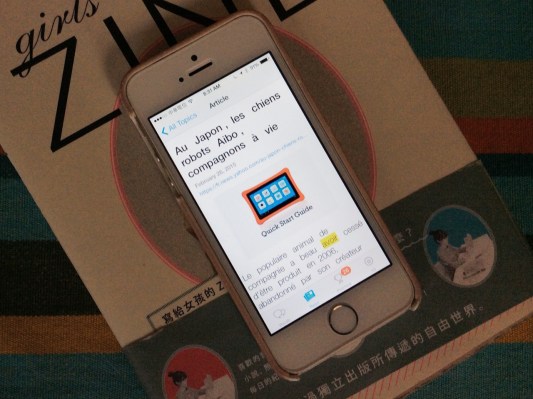Lingua.ly, which saves language students from the tedium of traditional textbooks, has raised $1 million. Participants in the round include Udi Netzer (a returning investor), Shai Rephaeli, Yochy Investments, and Seed Fund 1776.
The site and apps pulls articles from the web-based on vocabulary lists and each users’ interests. TechCrunch last covered the startup when it launched its free Android app in April 2014 (it is also now available for iOS).
The latest funding brings Lingua.ly’s total raised so far to $1.8 million. Meredith Circerchia, a linguist and the startup’s director of communications and e-learning, says the fresh capital will be used to bring Lingua.ly’s free tools, which are available online as a Chrome extension and as Android and iOS apps, to new platforms and markets. The startup plans to monetize through premium features that it will release on the web and its apps later this year.
Lingua.ly is a nifty tool for aspiring polyglots because it has flashcards with recorded pronunciations, a dictionary, a repetition game to help with memorization, and several categories of articles to browse so users can see the words in common usage, instead of the more formal and stilted examples often found in textbooks.
“The Lingua.ly algorithm is based on research concerning vocabulary acquisition from context,” says Circerchia. “It estimates your vocabulary in a foreign language and then finds newspaper articles that contain mostly words you know.”
“This is because when most of the words in a sentence are familiar to you, you can take a more informed guess at the meaning of new terms. Even if you guess incorrectly, expending extra cognitive energy thinking about a word helps dig the memory in deeper,” she adds.
Providing deeper context and tailoring content to users’ interests is what sets Lingua.ly apart from (and makes it a good complement) to other language learning apps like Duolingo and Memrise. Circherchia says Lingua.ly is targeted at intermediate and advanced students who have already know a lot of vocabulary, but want to improve and maintain their language skills.
The app already has full support for 10 languages: English, French, Spanish, Italian, Portuguese, German, Dutch, Russian, Arabic, and Hebrew. Users studying other languages can make flashcards and look up words in Lingua.ly’s dictionary, but they lack the benefit of audio pronunciations and articles. The startup has had a lot of requests for Scandinavian and Asian languages, however, and hopes to add several later this year, as well as better dictionary support for languages like Hindu and Farsi.
Future features will be based on natural language processing technology, which will help Lingua.ly pull up a more personalized and diverse assortment of articles for each user. Circherchia says that the site and app will also add more tools for beginning learners who aren’t ready to dive into articles yet, as well as multimedia. Classroom-oriented features, including a dashboard for teachers, is also in the works.
